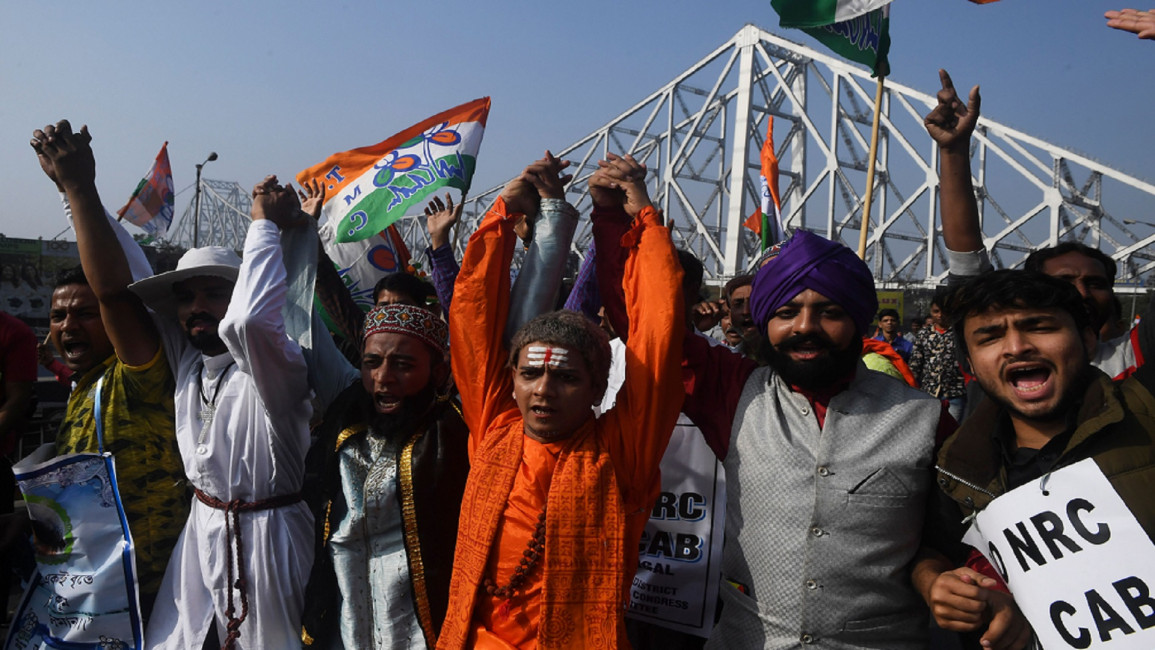Follow us on Twitter and Instagram to stay connected
India's Supreme Court delays hearing 59 petitions against new citizenship law
India's Supreme Court delays hearing 59 petitions against new citizenship law
The highest court in India has decided to postpone hearing nearly 60 petitions challenging its new citizenship law, which has been criticised for being unconstitutional and anti-Muslim.
2 min read
India's Supreme Court has postponed hearing petitions against the new citizenship law next month, despite mounting anger and accusations that it is discrimination against its Muslim population.
The court told the federal government to prepare a response for the challenges but declined to stay the implantation of the Citizenship Amendment Act.
In a hearing this morning, a three-judge top court bench headed by Chief Justice of India SA Bobde said: "We will have to see whether the Act has to be stayed."
The court said it would consider the 59 petitions next year on 22 January.
This latest news comes as authorities imposed an emergency law banning large gatherings in parts of New Delhi after fresh protests were mired with violence. Six people died in the northeast and up to 200 were injured in Delhi, including 12 police officers.
The controversial law has been called anti-Muslim as it fast-tracks citizenship for non-Muslims from three neighbouring countries.
Experts argue the move is an attempt from Prime Minister Narendra Modi to push a Hindu nationalist agenda to marginalize the 200-million strong Muslim minority.
Modi vehemently denies the accusation, tweeting on Monday that the new law "does not affect any citizen of India of any religion", and accused "vested interest groups" of stoking the "deeply distressing" unrest.
The UN human rights office last week said it was concerned the law "would appear to undermine the commitment to equality before the law enshrined in India's constitution".
The law seeks to amend India's 64-year-old citizenship law, which currently prohibits illegal migrants from becoming Indian citizens.
The act offers amnesty to non-Muslim illegal immigrants from Pakistan, Bangladesh and Afghanistan.
In addition it speeds up the path to citizenship for members of six religious minorities - Hindu, Sikh, Buddhist, Jain, Parsi and Christian, providing they can prove that they are from one of the three countries listed in the act.
Muslims are not included in this list, which is the point of contention and source of protest for Indians across the country – both Muslim and non-Muslim alike.
The new law is being challenged in the Supreme Court by rights groups and a Muslim political party, arguing that it is against the constitution and India's cherished secular traditions.
Ashok Swain, a professor at Sweden's Uppsala University said that the scale of the protests had caught Modi's government off guard.
"The protest is getting international attention and also spreading to different parts of the country.
"This certainly will add pressure on the regime when the economy has failed," Swain told AFP.
The court told the federal government to prepare a response for the challenges but declined to stay the implantation of the Citizenship Amendment Act.
In a hearing this morning, a three-judge top court bench headed by Chief Justice of India SA Bobde said: "We will have to see whether the Act has to be stayed."
The court said it would consider the 59 petitions next year on 22 January.
This latest news comes as authorities imposed an emergency law banning large gatherings in parts of New Delhi after fresh protests were mired with violence. Six people died in the northeast and up to 200 were injured in Delhi, including 12 police officers.
The controversial law has been called anti-Muslim as it fast-tracks citizenship for non-Muslims from three neighbouring countries.
|
Experts argue the move is an attempt from Prime Minister Narendra Modi to push a Hindu nationalist agenda to marginalize the 200-million strong Muslim minority.
Modi vehemently denies the accusation, tweeting on Monday that the new law "does not affect any citizen of India of any religion", and accused "vested interest groups" of stoking the "deeply distressing" unrest.
The UN human rights office last week said it was concerned the law "would appear to undermine the commitment to equality before the law enshrined in India's constitution".
The law seeks to amend India's 64-year-old citizenship law, which currently prohibits illegal migrants from becoming Indian citizens.
The act offers amnesty to non-Muslim illegal immigrants from Pakistan, Bangladesh and Afghanistan.
In addition it speeds up the path to citizenship for members of six religious minorities - Hindu, Sikh, Buddhist, Jain, Parsi and Christian, providing they can prove that they are from one of the three countries listed in the act.
Muslims are not included in this list, which is the point of contention and source of protest for Indians across the country – both Muslim and non-Muslim alike.
The new law is being challenged in the Supreme Court by rights groups and a Muslim political party, arguing that it is against the constitution and India's cherished secular traditions.
Ashok Swain, a professor at Sweden's Uppsala University said that the scale of the protests had caught Modi's government off guard.
"The protest is getting international attention and also spreading to different parts of the country.
"This certainly will add pressure on the regime when the economy has failed," Swain told AFP.



